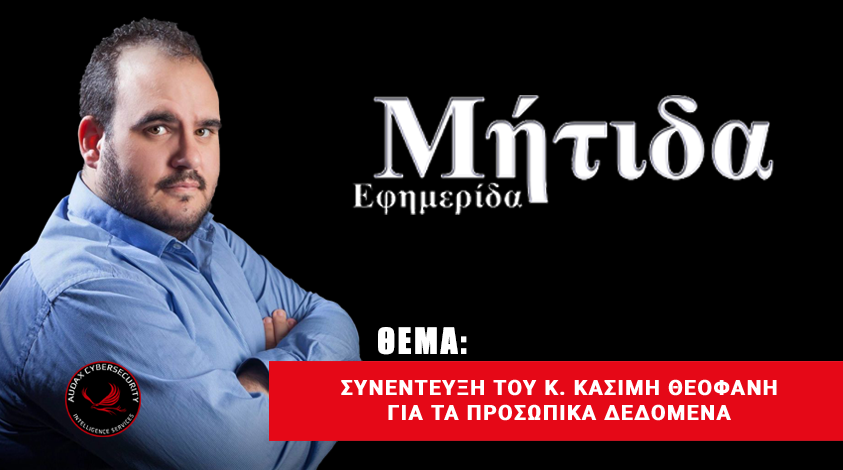Η εφημερίδα ΜΗΤΙΔΑ είναι από τις μεγαλύτερες εφημερίδες στον Νομό Κορινθίας!
Ερώτηση: Για πρώτη φορά στην ανθρώπινη ιστορία υπάρχει ένα μάτι, μια παγκόσμια δύναμη που παρακολουθεί τα πάντα με την δική μας συμμετοχή, καθώς αφήνουμε τα προσωπικά μας αποτυπώματα στο διαδίκτυο, μπορούμε να προστατεύσουμε την ιδιωτικότητα μας;
Απάντηση: Κάθε φορά που επισκεπτόμαστε μία ιστοσελίδα, ο πάροχος internet (π.χ. Cosmote, Vodafone) και η ίδια η ιστοσελίδα που επισκεπτόμαστε μπορούν να δουν την ψηφιακή μας ταυτότητα, καθώς επίσης και το περιεχόμενο το οποίο επισκεπτόμαστε, τα οποία αποτελούν προσωπικά δεδομένα. Τις περισσότερες φορές αυτό δεν αποτελεί πρόβλημα, καθώς αυτά τα δεδομένα δεν είναι μεγάλης σημασίας και δεν χρησιμοποιούνται με κακό σκοπό.
Πιο συγκεκριμένα, τα δεδομένα αυτά περιλαμβάνουν την IP, το ψηφιακό μας αποτύπωμα και το περιεχόμενο που επισκεπτόμαστε. Η IP είναι ένας αριθμός, τον οποίο μας καταχωρεί ο πάροχος internet, και τον οποίο έχει συνδέσει με το ονοματεπώνυμό μας. Βέβαια, μόνο ο πάροχος ξέρει ότι η IP αυτή ανήκει σε εμάς, ενώ κάποιος τρίτος π.χ. μια ιστοσελίδα δεν γνωρίζει ποιο πρόσωπο κατέχει αυτήν την IP. Το ψηφιακό μας αποτύπωμα περιλαμβάνει πληροφορίες όπως ποιόν φυλλομετρητή χρησιμοποιούμε και σε ποιά έκδοση, το λειτουργικό μας σύστημα, το μέγεθος της οθόνης μας, τις προεπιλεγμένες γραμματοσειρές μας κλπ. Αυτό το αποτύπωμα δεν είναι μοναδικό όπως η IP, δηλαδή θα μπορούσαμε να έχουμε το ίδιο ψηφιακό αποτύπωμα με κάποιον άλλον στο διαδίκτυο. Εντούτοις, είναι αρκετό για να μας αναγνωρίσει κάποιος ανάμεσα σε ένα μικρό αριθμό χρηστών π.χ. 1000 χρήστες. Τέλος το περιεχόμενο της σελίδας που επισκεπτόμαστε μπορεί να περιέχει απλό κείμενο, κωδικούς, ευαίσθητο περιεχόμενο κλπ.
Κάθε ένα από τα παραπάνω υπάρχουν τρόποι με τους οποίους μπορούμε να το αποκρύψουμε. Για να κρύψουμε την IP μας, χρησιμοποιούμε τεχνολογίες όπως VPN, proxy server, TOR. Για να κρύψουμε το ψηφιακό μας αποτύπωμα μπορούμε να χρησιμοποιήσουμε φυλλομετρητές με κοινές ρυθμίσεις και σε κοινό μέγεθος παραθύρου, όπως για παράδειγμα οι default ρυθμίσεις του φυλλομετρητή TOR. Τέλος, θα μπορούσαμε να κρύψουμε απ’τον πάροχο internet το περιεχόμενο που επισκεπτόμαστε, με την χρήση κρυπτογράφησης π.χ. SSL, VPN, TOR.
Συνήθως δεν χρειάζεται να κρύψουμε το ψηφιακό μας αποτύπωμα, εφόσον είναι κοινό μεταξύ πολλών ατόμων και δεν μας ταυτοποιεί προσωπικά. Όσον αφορά στην IP, υπάρχουν μερικές σπάνιες περιπτώσεις στις οποίες θέλουμε να την κρύψουμε, όπως για παράδειγμα όταν επισκεπτόμαστε ιστοσελίδες οι οποίες είναι διαθέσιμες μόνο για IP από συγκεκριμένες χώρες (συχνά σε ταινίες online). Τέλος το περιεχόμενο είναι σημαντικό να είναι κρυπτογραφημένο, για τον λόγο αυτό χρησιμοποιούμε ιστοσελίδες που έχουν στην μπάρα διευθύνσεων το πρόθεμα https και όχι http.
Ερώτηση: Μπορούμε να εμποδίσουμε τη χρήση των προσωπικών μας δεδομένων και να αποφύγουμε τον διαφημιστικό καταιγισμό;
Απάντηση: Στις μέρες μας, λαμβάνουμε διαφημιστικό περιεχόμενο από πολλές και διαφορετικές πηγές online.
Για διαφημιστικά μηνύματα ηλεκτρονικού ταχυδρομείου, μπορούμε να πατήσουμε το κουμπί unsubscribe (Απεγγραφή), το οποίο υπάρχει συνήθως με μικρά γράμματα στο κάτω μέρος του email. Στην περίπτωση που δεν υπάρχει, καλό θα είναι να επικοινωνήσουμε με την εταιρεία και να τους πούμε ότι θέλουμε να μας διαγράψουν από το newsletter τους. Η εταιρεία είναι υποχρεωμένη να το κάνει βάση του νόμου.
Για να αποτρέψουμε τα διαφημιστικά τηλεφωνήματα, μπορούμε να καλέσουμε τον πάροχο τηλεφωνίας μας π.χ. Cosmote και να του πούμε να μας εγγράψει στο άρθρο 11. Έπειτα, θα είναι παράνομο να μας ξανακαλέσουν για διαφημιστικούς σκοπούς, από οποιαδήποτε εταιρεία.
Για να αποτρέψουμε διαφημίσεις κατά την περιήγησή μας σε ιστοσελίδες, μπορούμε να εγκαταστήσουμε την επέκταση Adblock Plus στον φυλλομετρητή μας.
Τέλος, βάση του GDPR, μπορούμε επικοινωνήσουμε με οποιαδήποτε επιχείρηση και να εμποδίσουμε τη χρήση των προσωπικών μας δεδομένων. Φυσικά αυτό δεν ισχύσει σε συγκεκριμένες περιπτώσεις, όπως σε δημόσιες υπηρεσίες, νοσοκομεία, ή εταιρείες οι οποίες προϋποθέτουν να αποδεχτούμε την επεξεργασία των δεδομένων μας ώστε να μας παρέχουν τις υπηρεσίες τους. Στην τελευταία περίπτωση, η απαγόρευση προς αυτές τις εταιρείες, να επεξεργάζονται τα δεδομένα μας, σημαίνει ότι δεν θα μπορούν πλέον να μας παρέχουν τις υπηρεσίες τους.
Ερώτηση: Πολύ συχνά εμφανίζεται η εφαρμογή cookies τι να κάνουμε;
Απάντηση: Τα cookies είναι μικρή ποσότητα πληροφορίας, με τη μορφή απλού κειμένου, που αποθηκεύεται στον υπολογιστή μας όταν επισκεπτόμαστε διάφορες σελίδες στο Internet.
Η πληροφορίες που αποθηκεύονται στα cookies εξαρτώνται από την εκάστοτε σελίδα. Το κείμενο των cookies μπορεί να περιλαμβάνει μεταξύ άλλων το user id μας, πότε επισκεφθήκαμε τελευταία φορά μια συγκεκριμένη σελίδα, προσωπικές μας προτιμήσεις στη σελίδα.
Τα cookies βοηθούν τις σελίδες να μας δείξουν περιεχόμενο που μας ενδιαφέρει προσωπικά ή να μας απαλλάξουν από περιττές εργασίες. Για παράδειγμα, αν ψάχνω για ταινίες στο IMDB, το IMDB γνωρίζει χάρη στα cookies του ποιες σελίδες έχω ήδη δει, και κάνει αντίστοιχα προτάσεις που θεωρεί πως θα με ενδιέφεραν. Ένα ακόμη παράδειγμα αποτελεί το facebook, το οποίο δεν μας ζητάει τον κωδικό πρόσβασης κάθε φορά που συνδεόμαστε σε αυτό, διότι μας αναγνωρίζει μέσω των cookies.
Ορισμένες φορές τα cookies είναι ενοχλητικά. Για παράδειγμα, αν αναζητήσουμε παπούτσια στο διαδίκτυο, έπειτα θα μας εμφανίζονται διαφημίσεις για παπούτσια για αρκετές μέρες, κάθε φορά που κάνουμε περιήγηση στο διαδίκτυο. Αυτού του είδους τα cookies ονομάζονται tracking cookies και μπορούμε να τα αποφύγουμε εγκαθιστώντας τις επεκτάσεις Adblock Plus ή Ghostery στον φυλλομετρητή μας.
Όταν εμφανίζεται μήνυμα για αποδοχή των cookies σε ιστοσελίδες, συνήθως είναι ακίνδυνο και δεν υπάρχει κανένας λόγος για ανησυχία. Παρόλα αυτά καλό θα ήταν να πατάμε αποδοχή μόνο στις περιπτώσεις που δεν υπάρχει η επιλογή απόρριψη ή σε ιστοσελίδες που εμπιστευόμαστε.
Ερώτηση: Οι εφαρμογές προστασίας είναι εύκολο να εγκατασταθούν ή είναι πολύπλοκες διαδικασίες;
Απάντηση: Τα μέτρα που μπορούν να ληφθούν για την προστασία της ιδιοτηκότητας στο διαδίκτυο είναι πολλά. Ανάλογα με της ανάγκες του κάθε χρήστη, θα πρέπει να υλοποιηθούν συγκεκριμένα μέτρα προστασίας της ιδιοτηκότητας. Κάποια από τα μέτρα είναι εύκολο να υλοποιηθούν απ’τον μέσο χρήστη, όπως για παράδειγμα η εγκατάσταση του adblock, ενώ άλλα απαιτούν τις γνώσεις ενός ειδικού, παραδείγματος χάριν η σωστή εγκατάσταση TOR, VPN κ.α.
Ερώτηση: Είναι αξιόπιστες οι εφαρμογές προστασίας EPIC, TOR, do not call;
Απάντηση: Θα εστιάσω περισσότερο στον Epic, καθώς θεωρώ ότι αυτός ικανοποιεί στο μέγιστο τις ανάγκες ενός καθημερινού χρήστη ο οποίος αναζητά ασφάλεια στο internet. Ο Epic βασίζεται σε ανοιχτό κώδικα που σημαίνει ότι οποιοσδήποτε προγραμματιστής μπορεί να τον εξετάσει και να διαπιστώσει αν υπονομεύει με οποιονδήποτε τρόπο τα προσωπικά δεδομένα των χρηστών του. Για τον λόγο αυτό, μπορούμε να τον εμπιστευόμαστε. Ο Epic βρίσκεται σε μόνιμη ιδιωτική λειτουργία (On Private Browsing), και δεν επιτρέπει σε τρίτους να ανιχνεύουν την περιήγησή μας, ενω παράλληλα ενσωματώνει δωρεάν VPN λειτουργία για μέγιστη ιδιοτικότητα και ανωνυμία στο internet. Επιπλέον δεν θα έχουμε δυνατότητα σύνδεσης προφίλ με τον λογαριασμό μας στην Google, ώστε να μην συλλέγονται τα προσωπικά μας δεδομένα.
Παρόλο που ο Tor χρησιμοποιεί πολλαπλά επίπεδα κρυπτογράφησης και είναι ανοιχτού κώδικα, χρησιμοποιείται συχνά για άλλους σκοπούς από αυτούς του μέσου χρήστη. Η ταχύτητα περιήγησης που μας παρέχει είναι αρκετά χαμηλότερη από αυτήν του Epic, ενώ πολλές ιστοσελίδες μπλοκάρουν τους χρήστες που τον χρησιμοποιούν. Συνήθως χρησιμοποιείται από δημοσιογράφους σε χώρες με δικτατορία και λογοκρισία ή για παράνομους σκοπούς όπως εμπόριο ναρκωτικών και όπλων.
Συμπερασματικά αν θέλετε μία εύκολη λύση για προστασία των προσωπικών σας δεδομένων, ο Epic είναι ο κατάλληλο φυλλομετρητής για εσάς.










